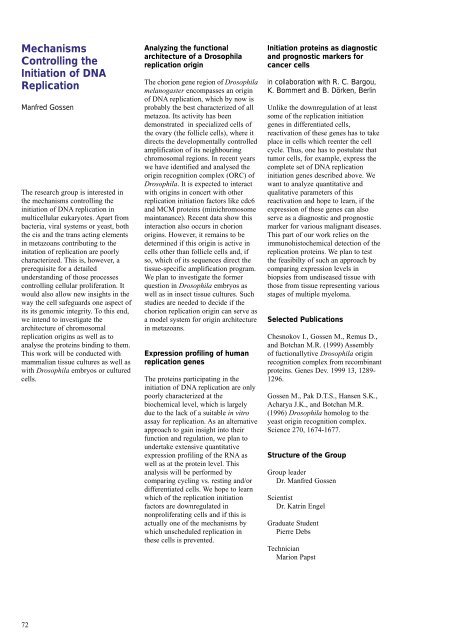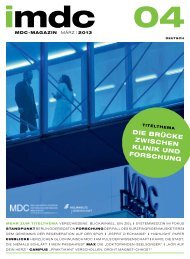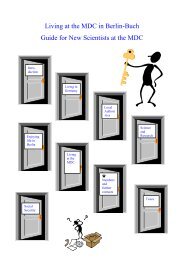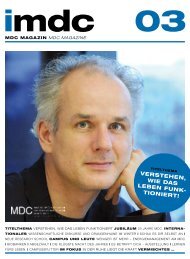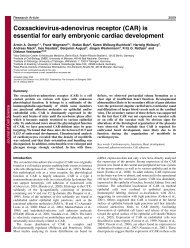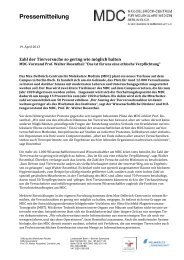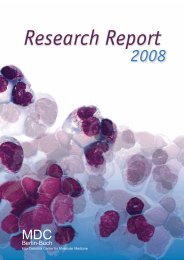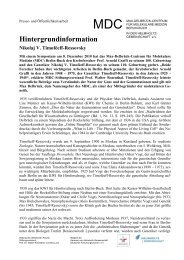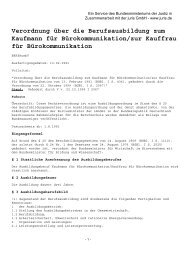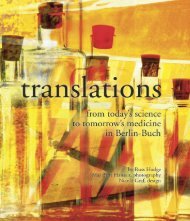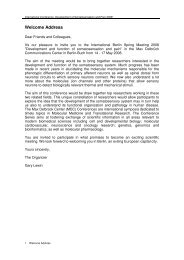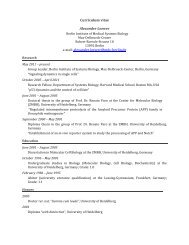Create successful ePaper yourself
Turn your PDF publications into a flip-book with our unique Google optimized e-Paper software.
Mechanisms<br />
Controlling the<br />
Initiation of DNA<br />
Replication<br />
Manfred Gossen<br />
The research group is interested in<br />
the mechanisms controlling the<br />
initiation of DNA replication in<br />
multicellular eukaryotes. Apart from<br />
bacteria, viral systems or yeast, both<br />
the cis and the trans acting elements<br />
in metazoans contributing to the<br />
initation of replication are poorly<br />
characterized. This is, however, a<br />
prerequisite for a detailed<br />
understanding of those processes<br />
controlling cellular proliferation. It<br />
would also allow new insights in the<br />
way the cell safeguards one aspect of<br />
its its genomic integrity. To this end,<br />
we intend to investigate the<br />
architecture of chromosomal<br />
replication origins as well as to<br />
analyse the proteins binding to them.<br />
This work will be conducted with<br />
mammalian tissue cultures as well as<br />
with Drosophila embryos or cultured<br />
cells.<br />
72<br />
Analyzing the functional<br />
architecture of a Drosophila<br />
replication origin<br />
The chorion gene region of Drosophila<br />
melanogaster encompasses an origin<br />
of DNA replication, which by now is<br />
probably the best characterized of all<br />
metazoa. Its activity has been<br />
demonstrated in specialized cells of<br />
the ovary (the follicle cells), where it<br />
directs the developmentally controlled<br />
amplification of its neighbouring<br />
chromosomal regions. In recent years<br />
we have identified and analysed the<br />
origin recognition complex (ORC) of<br />
Drosophila. It is expected to interact<br />
with origins in concert with other<br />
replication initiation factors like cdc6<br />
and MCM proteins (minichromosome<br />
maintanance). Recent data show this<br />
interaction also occurs in chorion<br />
origins. However, it remains to be<br />
determined if this origin is active in<br />
cells other than follicle cells and, if<br />
so, which of its sequences direct the<br />
tissue-specific amplification program.<br />
We plan to investigate the former<br />
question in Drosophila embryos as<br />
well as in insect tissue cultures. Such<br />
studies are needed to decide if the<br />
chorion replication origin can serve as<br />
a model system for origin architecture<br />
in metazoans.<br />
Expression profiling of human<br />
replication genes<br />
The proteins participating in the<br />
initiation of DNA replication are only<br />
poorly characterized at the<br />
biochemical level, which is largely<br />
due to the lack of a suitable in vitro<br />
assay for replication. As an alternative<br />
approach to gain insight into their<br />
function and regulation, we plan to<br />
undertake extensive quantitative<br />
expression profiling of the RNA as<br />
well as at the protein level. This<br />
analysis will be performed by<br />
comparing cycling vs. resting and/or<br />
differentiated cells. We hope to learn<br />
which of the replication initiation<br />
factors are downregulated in<br />
nonproliferating cells and if this is<br />
actually one of the mechanisms by<br />
which unscheduled replication in<br />
these cells is prevented.<br />
Initiation proteins as diagnostic<br />
and prognostic markers for<br />
cancer cells<br />
in collaboration with R. C. Bargou,<br />
K. Bommert and B. Dörken, Berlin<br />
Unlike the downregulation of at least<br />
some of the replication initiation<br />
genes in differentiated cells,<br />
reactivation of these genes has to take<br />
place in cells which reenter the cell<br />
cycle. Thus, one has to postulate that<br />
tumor cells, for example, express the<br />
complete set of DNA replication<br />
initiation genes described above. We<br />
want to analyze quantitative and<br />
qualitative parameters of this<br />
reactivation and hope to learn, if the<br />
expression of these genes can also<br />
serve as a diagnostic and prognostic<br />
marker for various malignant diseases.<br />
This part of our work relies on the<br />
immunohistochemical detection of the<br />
replication proteins. We plan to test<br />
the feasibilty of such an approach by<br />
comparing expression levels in<br />
biopsies from undiseased tissue with<br />
those from tissue representing various<br />
stages of multiple myeloma.<br />
Selected Publications<br />
Chesnokov I., Gossen M., Remus D.,<br />
and Botchan M.R. (1999) Assembly<br />
of fuctionallytive Drosophila origin<br />
recognition complex from recombinant<br />
proteins. Genes Dev. 1999 13, 1289-<br />
1296.<br />
Gossen M., Pak D.T.S., Hansen S.K.,<br />
Acharya J.K., and Botchan M.R.<br />
(1996) Drosophila homolog to the<br />
yeast origin recognition complex.<br />
Science 270, 1674-1677.<br />
Structure of the Group<br />
Group leader<br />
Dr. Manfred Gossen<br />
Scientist<br />
Dr. Katrin Engel<br />
Graduate Student<br />
Pierre Debs<br />
Technician<br />
Marion Papst


